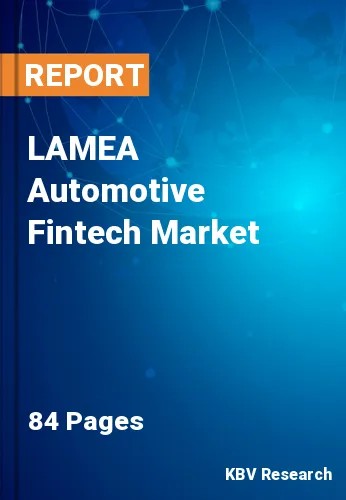The Latin America, Middle East and Africa Automotive Fintech Market would witness market growth of 11.0% CAGR during the forecast period (2022-2028).
Due to customers' ability to find and buy their favorite vehicles from anywhere, car dealers have become somewhat commoditized due to the rise of internet shopping. Fintechs have concentrated on streamlining the procedure by developing platforms and pricing comparison tools that provide borrowers access to all available financing choices. Given the current supply chain challenges, some systems even enable borrowers to see real-time dealer inventory and change the financing conditions to fit their price sensitivity (allowing for adding insurance or supporting products).
Customers using a dealership may use the platform to apply to several lenders and customize their requests to meet their requirements. Conversely, lenders who may have yet to establish independent connections with dealers may have the opportunity to access dealerships (and, therefore, clients) that they would not have otherwise been able to do so on their own without the platform. Thus the purchase rate is also the sale rate. Moreover, firms are creating software enabling dealerships to sell straight from the factory, allowing customers to "direct-build" a car to their specifications.
The National Industrial Development Center (NIDC) intends to attract three to four original equipment manufacturers along the ICE and EV value chain to reach the Kingdom's 2030 goal of producing 300,000 automobiles annually with 40% local content. NIDC fosters industrialization by providing loans, tax advantages, and tariff exemptions. The need for vehicle body panels, wheel components, tires, seats, fuel pumps, seat belts, rear indicator light covers, headlights, bumpers, and engine covers gives corporations seeking joint venture agreements in the Kingdom opportunities for entry or expansion. As a result, the significant assistance offered to the automotive sector by the government, particularly EVs, and the high rate of digitalization is anticipated to enhance the need for automotive fintech for buying, rental and other services and propel the market expansion in the LAMEA.
The Brazil market dominated the LAMEA Automotive Fintech Market by Country in 2021, and would continue to be a dominant market till 2028; thereby, achieving a market value of $1,434.6 million by 2028. The Argentina market is estimated to grow a CAGR of 11.6% during (2022 - 2028). Additionally, The UAE market would display a CAGR of 10.7% during (2022 - 2028).
Based on Channel, the market is segmented into On Demand, and Subscription. Based on Vehicle Type, the market is segmented into Passenger Car, and Commercial Vehicle. Based on Propulsion Type, the market is segmented into ICE, and Electric. Based on End User, the market is segmented into Digital Loans & Purchase, Online Leasing, Online Insurance, and In-Vehicle Payments. Based on countries, the market is segmented into Brazil, Argentina, UAE, Saudi Arabia, South Africa, Nigeria, and Rest of LAMEA.
Free Valuable Insights: The Worldwide Automotive Fintech Market is Projected to reach USD 82.6 Billion by 2028, at a CAGR of 9%
The market research report covers the analysis of key stake holders of the market. Key companies profiled in the report include Kuwy Technology Services Pvt Ltd. (Volkswagen Financial Services AG) (Volkswagen AG), Creditas Soluções Financeiras Ltda., Euroclear SA/NV (Euroclear Holding SA/NV), Grab Holdings Inc, Blinker Inc., The Savings Group, Inc. (Autopay), Cuvva Limited, RouteOne LLC, By Miles, and AutoFi, Inc.
By Channel
By Vehicle Type
By Propulsion Type
By End User
By Country
Our team of dedicated experts can provide you with attractive expansion opportunities for your business.

